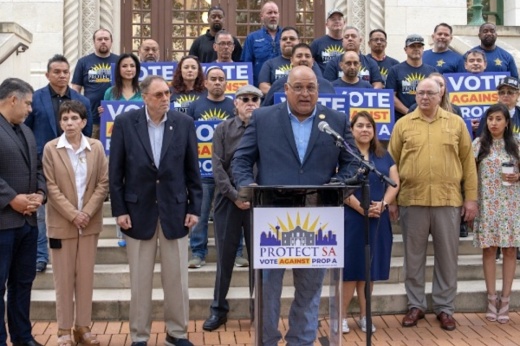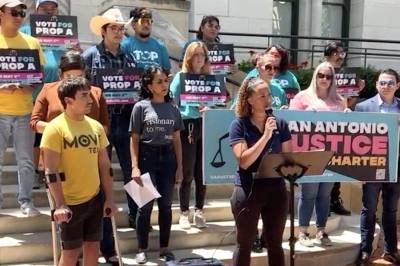San Antonio voters taking part in the May 6 election soundly defeated Proposition A, a proposed city charter amendment that called for requiring police officers to issue only citations in the local cite and release program, among other public safety-related measures.
As of 11:30 p.m., 71.6% of voters rebuffed the ballot measure, Bexar County elections data showed.
Proposition A had support from local and state progressive groups, and four City Council members, according to Community Impact reports.
Community Impact reported, however, Prop A drew criticism from Mayor Ron Nirenberg and a majority of council members, including three north side incumbents, as well as from many local law enforcement, business advocacy and conservative organizations.
Proposition A supporters said they saw their proposed charter amendment, which also sought ending local enforcement of state abortion and marijuana laws, and permanently banning the use of police chokeholds and no-knock warrants, as a way to demand further police accountability, defend civil liberties, and to help protect vulnerable community members from fear of being immediately jailed if arrested for a low-level, non-violent arrest.
In an unsigned statement, Prop A organizers thanked residents who signed a petition to get the proposal on the ballot, adding the measure was designed to increase safety and equity in all communities.
But organizers also claimed opponents spread “misinformation and false insinuations” to scare voters into dismissing Prop A.
“We will continue to fight for the transformative change that our city needs, for true community safety, and for the protection of fundamental rights for every San Antonian,” organizers said.
Some Prop A critics said calls to locally decriminalize abortion and marijuana cannot supersede existing state laws, and demands to totally ban chokeholds and no-knock warrants could hinder the way law enforcement personnel do their jobs.
But most of detractors' fire was aimed at a proposal regarding the cite and release program, where Prop A backers sought to eliminate officer discretion in making an on-site arrest.
Critics ranging from the San Antonio Police Officers Association and chambers of commerce to a number of sitting elected representatives expressed concern that expanding the cite and release program could increase crimes, such as theft and graffiti, and could even encourage some people to flout even stronger local laws.
SAPOA issued an unsigned statement, saying Prop A’s defeat was a firm decision by voters.
“We will not become another statistic, we will not tolerate criminal leniency, we will not allow our city to crumble,” SAPOA said.
Regarding Prop A's failure, Nirenberg said he understands the frustration expressed by advocates and others who have voiced concern about policing issues or what they see as a failure of state leadership related to abortion rights or marijuana.
“In the end, Proposition A didn’t represent progress. It really would’ve made it more difficult for the community to advance the progress we have made,” Nirenberg told Community Impact.
Nirenberg said Prop A misled voters into thinking decriminalization of abortion or marijuana can happen at the local level, when actually state laws prevail on such topics.
Nirenberg pledged to address public safety concerns, and to see how best the city can have its voice heard at the state legislative level on issues such as abortion and marijuana.
“I continue to do the necessary work at the local level, to every extent possible under our local authority, on reproductive healthcare rights of women and focus on safety for everyone,” he added.
County election totals pointed to a 15.3% voter turnout in this spring local election cycle, lower than the 17.2% turnout seen in the city's 2021 elections.






